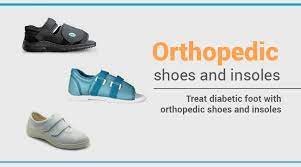Orthopedic shoes have been used for decades to help people with foot and ankle problems maintain a healthy and active lifestyle. These shoes are designed to provide extra support, stability, and comfort for people with a range of conditions, including plantar fasciitis, heel pain, flat feet, and back pain.
But what does the research say about the effectiveness of orthopedic shoes? Let's take a closer look.
The Benefits of Orthopedic Shoes:
-Pain Relief: Many studies have shown that orthopedic shoes can help to reduce pain and discomfort associated with foot and ankle problems. For example, a study published in the Journal of Foot and Ankle Research found that wearing orthopedic shoes can significantly reduce pain in people with plantar fasciitis.
-Improved Balance and Stability: Orthopedic shoes are designed to provide extra support and stability for the feet, which can help to improve balance and reduce the risk of falls in older adults. A study published in the Journal of the American Geriatrics Society found that orthopedic shoes can improve balance and stability in older adults with foot problems.
-Reduced Risk of Injury: Orthopedic shoes can also help to reduce the risk of injury and keep feet healthy. For example, a study published in the Journal of Foot and Ankle Surgery found that wearing orthopedic shoes can reduce the risk of ankle sprains in people with ankle instability.
-Improved Posture: Orthopedic shoes can also help to improve posture and reduce back pain. A study published in the Journal of Foot and Ankle Research found that wearing orthopedic shoes can help to improve posture and reduce lower back pain in people with flat feet.
Choosing the Right Orthopedic Shoes
When choosing orthopedic shoes, it's important to consider the following factors:
-Fit: Make sure the shoes fit properly and provide enough room for the feet to move and breathe.
-Support: Look for shoes with adequate arch support and cushioning, which will help to reduce pressure on the feet and prevent foot injuries.
-Stability: Choose shoes with a stable and sturdy design, which will help to improve balance and reduce the risk of falls.
-Comfort: Look for shoes with a cushioned insole and a comfortable upper, which will help to reduce discomfort and keep feet feeling fresh.
-Quality: Invest in high-quality orthopedic shoes that are made from durable materials and are designed to last.
Final Thoughts:
The research clearly shows that orthopedic shoes can be highly effective in helping people with foot and ankle problems maintain a healthy and active lifestyle. So if you're struggling with foot or ankle pain, consider investing in a pair of orthopedic shoes today and start enjoying the many benefits they have to offer!
